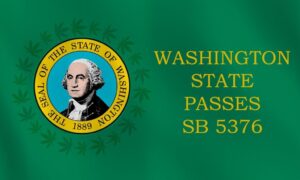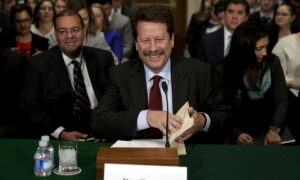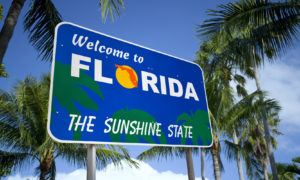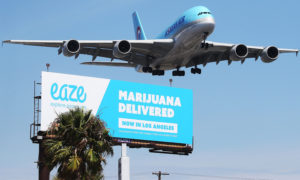
Nevada state Sen. Don Gustavson, R-Sparks, smells a sample of marijuana as Christopher Price, a budtender at the Blum medical marijuana dispensary, describes the operation during a tour of the store in Reno. Nevada voters legalized recreational cannabis in November, and officials are trying to put rules in place to start selling it on July 1, 2017. (Scott Sonner/AP)
It would be the shortest turnaround from legalization to the launch of sales in any of the other seven states and District of Columbia where recreational cannabis is legal. Regulations are complicated and typically lengthy to enact around a drug still banned by the U.S. government.
But Nevada’s quick timeline faces a major hurdle: A legal battle between the state and the powerful liquor lobby over who can distribute the drug to retailers.
Here’s a look at the obstacles to recreational cannabis in Nevada and what could happen next:
What’s the Rush?
Anticipating customer demand, the state hopes to get a head-start on collecting millions of dollars in tax revenue devoted to education. Sales are required to start by Jan. 1, 2018, and are expected to bring in at least $120 million over two years.
The Nevada Cannabis Coalition estimates an additional $3 million a month if sales start in a little more than two weeks. Oregon and Colorado each raised about $3.5 million in tax revenue in the first month of their recreational sales.
Nevada’s expedited effort is in stark contrast to its handling of medical marijuana, which went on sale in 2015 — 15 years after voters legalized it.
Will Recreational Cannabis Be Sold July 1?
It’s not clear. The state said it intends to issue licenses so users can start buying marijuana buds, concentrate and edibles at as many as 60 existing medical marijuana dispensaries on that date.
When sales happen, anyone 21 or older can buy up to an ounce of cannabis but can only smoke or consume it in their homes. But the courts will decide what happens next.
Why Are the Courts Involved?
A group of alcohol distributors and state-regulated medical marijuana dealers are fighting over who should be licensed to distribute marijuana from growers to retailers. The liquor lobby sued, saying the state didn’t give it the first shot at distribution licenses as the law calls for, the only legal state with that arrangement.
The state Department of Taxation wants to license some existing medical marijuana cultivators and retailers to serve as their own distributors temporarily, saying there was not enough interest among alcohol distributors to do the work. The liquor distributors denied that, and a judge temporarily sided with them and blocked licenses from being issued.
The judge this week refused Nevada’s request to dismiss the lawsuit and left the order in place until he makes a permanent ruling following a hearing Monday.
Why Is the Liquor Industry Getting Into Marijuana?
The law says “marijuana should be regulated in a manner similar to alcohol.” The political action committee promoting the measure was even named Regulate Marijuana Like Alcohol.
Cannabis rules are patterned after the system regulating alcohol sales, with separate licenses for wholesalers, distributors and retailers. Granting licensed liquor distributors first dibs at cannabis distribution licenses was seen by the state as a way to ensure the integrity of the system because they have already undergone extensive background checks and established a record of doing business with the state.
How Does it Work in Other States?
Like Nevada, Colorado and Oregon initially granted recreational retail licenses only to existing medical marijuana businesses but now provides them to any qualifying applicant.
Maine and Massachusetts give existing medical marijuana facilities a priority for recreational licensing. Colorado bars people from holding both alcohol and marijuana licenses.
Washington state didn’t have a medical program before legalizing recreational marijuana and now requires all cananbis business to be licensed by its state Liquor Control Board.
What’s Next?
If Carson City District Judge James Wilson rules against the liquor distributors, licenses will be issued to existing medical marijuana facilities to transport products to retail stores in time for sales to begin July 1.
Otherwise, it’s complicated. Wilson could order the state to exclusively license liquor distributors, but that could still mean at least some sales starting in two weeks.
He also could strike down the regulation itself. That would restart the whole rule-making process, which could take months. There’s also the possibility the loser would appeal, prolonging the uncertainty indefinitely.
Link – AP




































